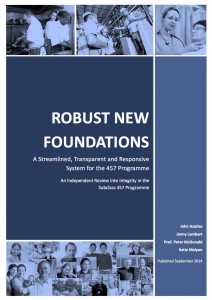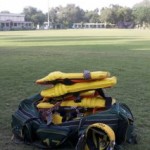by Paul Cutler | Apr 1, 2015 | Visa
The following is an extract from the DIBP policy manual:
DIBP is responsible for identifying each person who crosses Australia’s border. This role is unique among Australian Government agencies. It involves establishing the identity of people born outside Australia (that is, non-citizens), to a sufficient standard to grant permission to enter and remain in Australia for the period of time and purpose authorised by their visa. The department fulfils this responsibility to ensure it can effectively deliver Australia’s visitor, migration and citizenship programmes, while preventing the entry of persons who may seek to threaten the national interest.
When short, medium and long-term visits and migration to Australia are reduced to core elements, they are about identity and intent. Is the person who they say they are? Are they coming to Australia for the lawful purpose authorised in their visa?
The department has a national responsibility to ensure that high standards of integrity apply to identifying non-citizens. Accurately establishing identity is the prerequisite for all security, character and immigration checks. There may be serious consequences if the department gets identity “wrong”.
To achieve these objectives, Australia is increasingly using biometric data in visa processing. Not all visa applications and not all visa applicants are subjected to biometrics. There is a current list of countries to which it applies and to the visa subclasses to which it applies on the DIBP website. See also the following: https://www.immi.gov.au/allforms/biometrics/offshore/
by Paul Cutler | Nov 24, 2014 | Visa
From 23 November 2014, IELTS is no longer the only way for proving english ability for migration purposes.
Migration Regulations 1994 – Specification of Evidence of Functional English Language Proficiency, specifies the following tests and scores for demonstrating functional English:
- An average score of at least 4.5 in an IELTS test.
- A total band score of at least 32 in a TOEFL iBT test
- An overall band score of 30 in a Pearsons (PTE) test
The new arrangement only applies for the following visa programmes
Temporary GraduateSkilled
Former Resident
Work and Holiday
The Test of English as a Foreign Language internet based test (TOEFL iBT) and the Pearson Test of English Academic (PTE Academic) have been added to the IELTS and OET tests for these visa programmes. The Cambridge English (Advanced (CAE) test will be also accepted from 1 January 2015.
Creative commons acknowledgement for the photograph
by Paul Cutler | Oct 4, 2014 | Parents, Visa
The DIBP website is reporting extensive queues for the other family (i.e. non-contributory parents, carers, remaining relative) visas:

- Non-Contributory Parent visa – approximately 30 years
- Carer visa – approximately 4.5 years
- Remaining Relative and Aged Dependent Relative – approximately 56 years
These visas were abolished but have been reinstated (probably for 6 months) following a successful disallowance motion in the Senate on 25 September 2014.
Needless to say these waiting times generally make the application futile. There will be some very elderly people granted visas, if they survive the wait in the queue!
Creative commons acknowledgement for the photograph.
by Paul Cutler | Sep 10, 2014 | 457, Visa
Today (10 September 2014), the review report, Robust New Foundations: A Streamlined, Transparent and Responsive System for the 457 Programme, was released and is available on the Department of Immigration
 and Border Protection’s website.
and Border Protection’s website.
There are 22 recommendations made (and in time we will see which are adopted), but the report identified the core questions as:
“…Our view is that an overarching principle of the 457 programme must be credibility – so as to ensure its continued success, the 457 programme must have legitimacy in the eyes of the Australian public as something that benefits Australia rather than does harm. The 457 programme will only be able to attain this necessary credibility when the Australian public can clearly see that policy problems are being resolved by robust evidenced based solutions.
There are two policy issues that we consider to be core questions in the existing 457 programme, as they directly address one of the two objectives. These are: proving that the position cannot be filled by a local worker and determining the skilled occupations that are used for the programme. It is our considered view that these issues are not well served by the current policy approaches and can be improved by adopting a more robust evidence- based approach”
by Paul Cutler | Aug 31, 2014 | Visa
Australia and New Zealand are hosting the 2015 Cricket World Cup. To facilitate movements between the countries there has been a “two country, one visa” arrangement announced by Minister Michaelia. Visitors wanting to attend the 2015 ICC Cricket World Cup to visit Australia and New Zealand between 26 January and 5 April 2015, will only require one visa.  A new Trans-Tasman Visa Arrangement between Australia and New Zealand will only require visitors to apply and pay for an Australian visa. New Zealand will then also grant a visitor visa between those dates to those holding an Australian visa. This new arrangement is expected to substantially benefit the tourism sector in both countries, by making travel easier and less costly for fans.International visitors will still be expected to meet the respective health, security and character requirements for each country. Minister Cash’s full media release is available here. The Minister’s media release also contains a link for further information at www.immi.gov.au/cwc The text of this post is based on information provided by the MIA in their Notice 102 provided as a service to members.
A new Trans-Tasman Visa Arrangement between Australia and New Zealand will only require visitors to apply and pay for an Australian visa. New Zealand will then also grant a visitor visa between those dates to those holding an Australian visa. This new arrangement is expected to substantially benefit the tourism sector in both countries, by making travel easier and less costly for fans.International visitors will still be expected to meet the respective health, security and character requirements for each country. Minister Cash’s full media release is available here. The Minister’s media release also contains a link for further information at www.immi.gov.au/cwc The text of this post is based on information provided by the MIA in their Notice 102 provided as a service to members.




 A new Trans-Tasman Visa Arrangement between Australia and New Zealand will only require visitors to apply and pay for an Australian visa. New Zealand will then also grant a visitor visa between those dates to those holding an Australian visa. This new arrangement is expected to substantially benefit the tourism sector in both countries, by making travel easier and less costly for fans.International visitors will still be expected to meet the respective health, security and character requirements for each country. Minister Cash’s full media release is available
A new Trans-Tasman Visa Arrangement between Australia and New Zealand will only require visitors to apply and pay for an Australian visa. New Zealand will then also grant a visitor visa between those dates to those holding an Australian visa. This new arrangement is expected to substantially benefit the tourism sector in both countries, by making travel easier and less costly for fans.International visitors will still be expected to meet the respective health, security and character requirements for each country. Minister Cash’s full media release is available